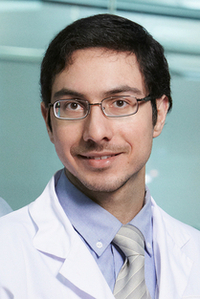Ahmad Haidar
 Ahmad Haidar received his BSc in electrical engineering from Kuwait University in 2006, MScA in mechanical engineering from École Polytechnique de Montréal in 2008, and PhD in electrical engineering from McGill University in 2013. During his PhD, he also spent one year at the institute of metabolic science at the University of Cambridge, UK, and two years at Montreal Institute of Clinical Research (IRCM). His research lies in applying feedback control theory and Bayesian modeling to diabetes-related physiological and medical problems. Since 2011, Ahmad is leading a unique engineering addition to the metabolic unit of the IRCM developing, in collaboration with clinicians, an electromechanical artificial pancreas for type 1 diabetes. Early in-patient clinical trials of the
Ahmad Haidar received his BSc in electrical engineering from Kuwait University in 2006, MScA in mechanical engineering from École Polytechnique de Montréal in 2008, and PhD in electrical engineering from McGill University in 2013. During his PhD, he also spent one year at the institute of metabolic science at the University of Cambridge, UK, and two years at Montreal Institute of Clinical Research (IRCM). His research lies in applying feedback control theory and Bayesian modeling to diabetes-related physiological and medical problems. Since 2011, Ahmad is leading a unique engineering addition to the metabolic unit of the IRCM developing, in collaboration with clinicians, an electromechanical artificial pancreas for type 1 diabetes. Early in-patient clinical trials of theartificial pancreas in adults and pediatric populations have shown significant improvement in reducing the incidence of the dangerously low glucose levels compared to conventional therapy, and out-patient trials are currently being conducted. The artificial pancreas is considered the most promising therapy for type 1 diabetes and its development is eagerly followed by the patients and the media. Dr. Haidar also worked on applying Bayesian modeling techniques combined with isotope tracer methodologies to investigate the pharmacokinetics and the pharmacodynamics of insulin and glucagon, and the absorption patterns of different meals in pediatrics with type 1 diabetes as well as pregnancy. In 2013, Dr. Hairdar received the McGill University William and Rhea Seath Award in Engineering Innovation, the IRCM André-Barbeau Excellence Award, and the Juvenile Diabetes Research Foundation Postdoctoral award. In 2014, Dr. Haidar was awarded the prestigious Banting Postdoctoral Fellowship.
